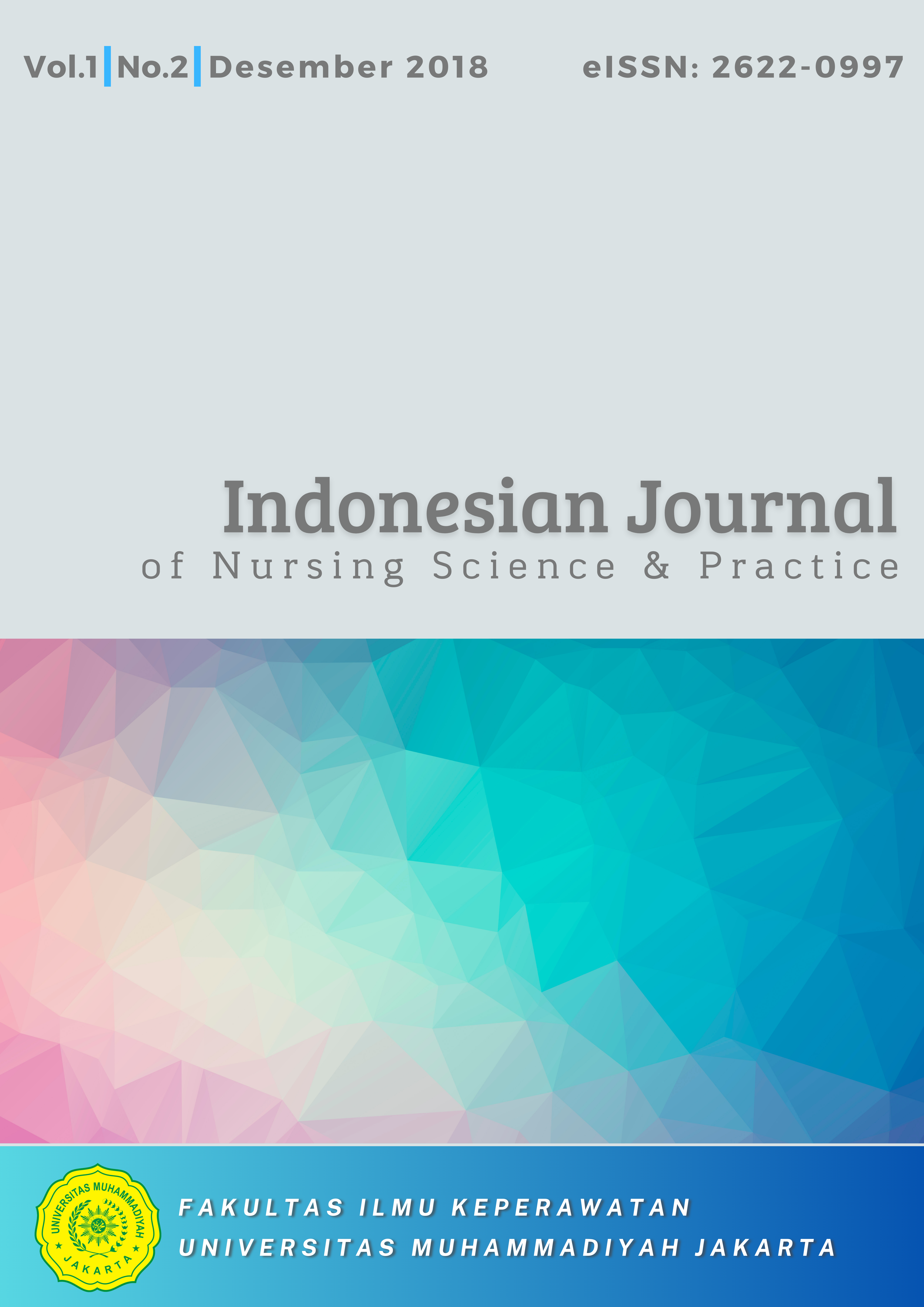PENINGKATAN SELF EFFICACY MELALUI SPIRITUAL CARE PADA PASIEN DIABETES MELITUS TIPE 2
DOI:
https://doi.org/10.24853/ijnsp.v1i2.83-91Abstract
Diabetes melitus merupakan penyakit kronis yang disandang seumur hidup dan jika gula darah tidak terkontrol akan menimbulkan berbagai komplikasi fisik hingga psikologi seperti depresi. Penyandang DM tipe 2 mempunyai resiko mengalami depresi 15% dibandingkan orang tanpa DM, Katon, WJ (2008). Penerimaan terhadap kondisi yang dialami akan meningkatkan keyakinan seseorang dalam melakukan perawatan dirinya atau dikenal self efficacy. Pencapaian pada Spiritual Well Being untuk meningkatkan kesehatan biologis, psikologis dan kesehatan sosial dilakukan melalui pemenuhan kebutuhan spiritual atau spiritual care. Penelitian ini bertujuan mengidentifikasi pengaruh spiritual care terhadap self efficacy pada pasien dengan Diabetes Melitus tipe 2. Metode penelitian menggunakan quasi eksperimen pre post test dengan kelompok kontrol. Jumlah sample dalam penelitian ini 16 responden pada setiap kelompok yang diambil menggunakan consecutive sampling. Hasil penelitian menunjukan peningkatan skore self efficacy setelah diberikan spiritual care sebanyak 6,875 point dan 3,625 point lebih tinggi dibandingkan kelompok kontrol dengan p value 0,03 (p >0,05). Pemberian spiritual care pada pasien DM tipe 2 meningkatkan keyakinan dalam merawat dirinya yang berdampak pada kesehatan fisik, psikologis, sosial dan diharapkan kualitas hidup penyandang DM semakin baik. Perawatan holistik dengan menyentuh aspek spiritual menjadi bagian penting pada pemberian asuhan keperawatan pada pasien DM tipe 2 khususnya dan untuk gangguan kronik lainnya. Kata Kunci: Diabetes Melitus Tipe 2, Self Efficacy, Spiritual Care ABSTRACTDiabetes mellitus is a chronic disease which occurred to patient for a lifetime and if blood sugar uncontrolled, it will cause various physical complications till psychology such as depression. People with DM type 2 have a 15% risk of depression than people without DM, Katon, WJ (2008). An Awareness to the occurred condition will increase person’s confidence for carrying out their self-care or known as self-efficacy. The achievement of Spiritual Well Being for improving biological, psychological and social health is done through fulfilling spiritual needs or spiritual care. This study aims to identify the effect of spiritual care on self-efficacy to the patients with diabetes mellitus type 2. The research method used quasi-experimental pre-post test with the control group. The number of samples in this study were 16 respondents, which in each group taken using consecutive sampling. The results showed an increase in self-efficacy scores after being given a spiritual care of 6.875 points and 3.625 points higher than the control group with p value 0.03 (p> 0.05). Giving spiritual care to the patients DM type 2 increases their confidence in caring for themselves which has an impact on physical, psychological, social health and expected to improve the quality of life of people with DM. Holistic care by touching spiritual aspects is being an important part for the provision of nursing care to the patients DM type 2 especially and for other chronic disorders.Keywords: Diabetes Melitus Type 2, Self Efficacy, Spiritual CareReferences
Aan Nuraeni, e. a. (2015). Kebutuhan Spiritual pada Pasien Kanker. Jurnal Keperawatan Padjajaran, Volume 3 Nomor 2.
Ariani, Y. (2011). Hubungan Antara Motivasi Dengan Efikasi Diri Pasien Dm Tipe 2 Dalam Konteks Asuhan Keperawatan Di Rsup. H. Adam Malik Medan. Depok: Fakultas Ilmu KeperawatanUniversitas Indonesia.
Atyanti Isworo, d. S. (2010). Hubungan Depresi dan Dukungan Keluarga Terhadap Kadar Gula Darah Pada Pasien Diabetes Mellitus Tipe 2 di RSUD Seragen. Jurnal keperawatan Soedirman , Volume 5. No 1.
Bandura, A. (2009). Societies, Self-Efficacy In Changing. New York: Cambridge University Press.
Chang, A. M. (2011). Validation of scales measuring self-efficacy and outcome expectancy in evidence-based ractice. Worldviews on Evidence-Based Nursing, 8(2), pp. 106-115
Delgado, C. (2018). Spiritual Care Practices and Nurses' Perceptions of. 24 th International Research Congress Prague . Czech Republic: Sigma Thea Tau International Honor Society of Nursing.
Fadma Yuliani, F. O. (2014). Hubungan Berbagai Faktor Risiko Terhadap Kejadian Penyakit Jantung Koroner Pada Penderita Diabetes Melitus Tipe 2. Jurnal Fakultas Kedokteran Universitas Andalas, 3 (1).
Firdaus. (2013). Hubungan Lamanya Menderita Diabetes Melitus Tipe 2 Terhadap Tingkat Depresi Pada Pasien Poli Penyakit Dalam RSD. Universitas Jember.
Gunawan, R. A. (206). Sumber-Sumber Efikasi Diri Karier Remaja. Jurnal Psikogenesis, Volume 4, No.2.
Henrietta Bernal, S. W. (2000). Corellates of Self-Efficacy in Diabetes Self-Care Among Hispanic Adults With Diabetes. The Diabetes Educator, Volume 26, Number 4.
Irawan, D. (2010). Prevalensi dan Faktor Resiko Kejadian Diabetes Melitus Tipe 2 di Daerah Urban Indonesia (Analisa Data Sekunder Riskesdas 2007) . Thesis Universitas Indonesia.
Janeth F Grant, N. H. (2009). Gender-Specific Epidemiology of Diabetes: a Representative. International Journal for Equity in Health, 8 : 6.
Kathryn B. Kott, M. R. (2008). Self-Efficacy, Outcome Expectation, Self-Care Behavior And Glycosylated Hemoglobin Level In Persons With Type 2 Diabetes. United States: ProQuest LLC.
Katon, W. J. (2018). Diabetes Complications Severity Index and Risk of Mortality, Hospitalization, and Healthcare Utilization. National Institutes of Health, 14(1): 15–23.
McSherry, W. (1998). Nurses Perceptions of Spirituality and Spiritual Care. Nursing Standar, Volume 13, Number 4.
Najmeh Jafari, e. a. (2014). Spiritual Well-Being and Quality of Life of Iranian Adults With Type 2 Diabetes. Evidence-Based Complementary and Alternative Medicine, Volume 2014, Article ID 619028, 8 pages.
Sulistria, Y. M. (2013). Tingkat Self care Pasien Rawat Jalan Diabetes mellitus tipe 2 di Puskesmas Kalirungut Surabaya. Jurnal Ilmiah Mahasiswa Universitas Surabaya , Vol.2 No.2.
Susanti, M. L. (2013). Dukungan Keluarga Meningkatkan Kepatuhan Diet Pasien Diabetes Mellitus di Ruang Rawat Inap RS. Baptis Kediri. Jurnal STIKES, Volume 6, No 1.
Wayne J. Katon, M. (2008). The Comorbidity of Diabetes Mellitus and Depression. The Amrecian Journal of Medicine, USA.
Z-w Wu, X Tong, J-YDong, & L-Q Qin. (2011) Dairy Consumption and Risk of Type 2 Diabetes Mellitus : a meta-analysis of cohort studies. European Journal of Clinical Nutrition. 65

